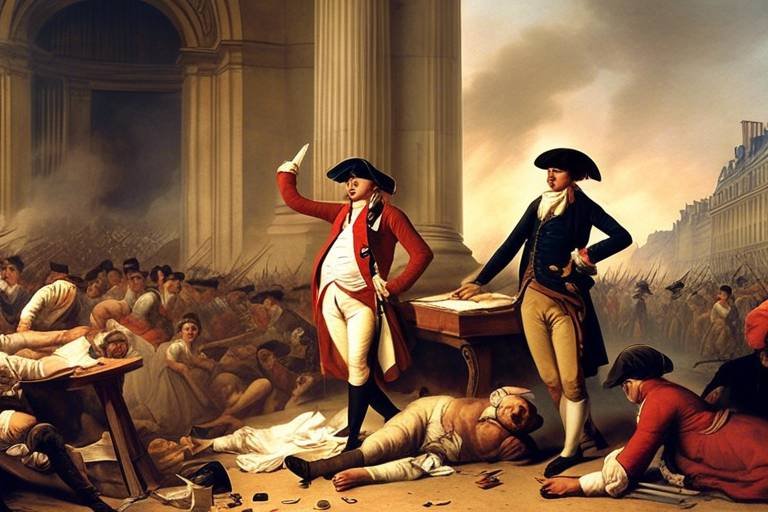The Legacy of the French Revolution on Modern Society
Exploring the profound impact of the French Revolution on contemporary society, analyzing its lasting influence on politics, culture, and social structures around the world.
The French Revolution, a pivotal moment in history, continues to cast a long shadow over modern society. Its reverberations can be felt in various aspects of our lives, shaping political ideologies, cultural norms, and social movements. Let's delve into how this historical event has left an indelible mark on the fabric of our modern world.
The French Revolution ushered in a new era of political thought, challenging traditional hierarchies and paving the way for the rise of democracy and nationalism. The revolutionary ideals of liberty, equality, and fraternity resonated far beyond France, inspiring movements for human rights and political reform across the globe.
At the heart of the French Revolution was a fervent call for social equality and justice. The revolutionary fervor fueled movements for civil rights, gender equality, and LGBTQ rights, laying the groundwork for ongoing struggles for equality and inclusivity in modern society.
The cultural impact of the French Revolution cannot be overstated. It sparked a renaissance of ideas, promoting secularism, individualism, and artistic expression. These values continue to shape our cultural landscape, influencing art, literature, and societal values.
The economic repercussions of the Revolution reverberate to this day. Changes in taxation, property rights, and labor relations introduced during the Revolution continue to influence economic policies and debates, highlighting the enduring legacy of this tumultuous period.
The ideals of the French Revolution transcended borders, inspiring revolutions worldwide. From Latin America to the Middle East, the call for independence, democracy, and social justice echoed the revolutionary spirit of 1789, shaping the course of modern history.
While the French Revolution championed noble ideals, it also left a legacy of violence and terror. The ethical implications of revolutionary actions continue to haunt modern societies, prompting reflections on the balance between revolutionary zeal and ethical restraint.
The Revolution sparked a renewed emphasis on education and intellectual enlightenment. Ideals of reason, science, and critical thinking promoted during this period laid the foundation for modern educational systems and philosophies, emphasizing the importance of knowledge and rational inquiry.
By challenging traditional sources of authority, from monarchies to religious institutions, the French Revolution set in motion a dynamic tension between authority and individual rights that persists to this day. Modern societies grapple with the legacy of this upheaval, navigating the complexities of power and governance in a rapidly changing world.
To be added upon completion of the article.

Political Transformations
Exploring the profound impact of the French Revolution on contemporary society, analyzing its lasting influence on politics, culture, and social structures around the world.
Political Transformations brought about by the French Revolution have left an indelible mark on the world stage. The Revolution reshaped the political landscape, igniting the flames of democracy, nationalism, and human rights movements across the globe. The ideals of liberty, equality, and fraternity championed during this turbulent period continue to resonate in modern political discourse, shaping the governance structures of nations worldwide.

Social Equality
Exploring the profound impact of the French Revolution on contemporary society, analyzing its lasting influence on politics, culture, and social structures around the world.
The French Revolution played a pivotal role in promoting ideals of equality, justice, and social reforms that have reverberated through history. It ignited a spark that fueled movements for civil rights, gender equality, and LGBTQ rights in modern times. The revolutionary spirit of demanding equal rights and opportunities for all individuals transcended borders and inspired people to stand up against discrimination and oppression.
One of the most significant legacies of the French Revolution in terms of social equality is the concept of universal human rights. The Declaration of the Rights of Man and of the Citizen, adopted during the Revolution, laid the foundation for the recognition of inherent rights for all individuals, regardless of their background or social status. This document became a cornerstone for future movements advocating for equality and justice.
Furthermore, the Revolution challenged the entrenched social hierarchies of the time, advocating for a more egalitarian society where merit and ability, rather than birthright, determined one's place in the world. This shift in mindset towards a more inclusive and fair society continues to influence contemporary movements striving for equal opportunities and treatment for all members of society.
While the journey towards achieving true social equality is ongoing and faces many challenges, the ideals and principles set forth by the French Revolution serve as a guiding light for those fighting for a more just and equitable world. The legacy of the Revolution in promoting social equality reminds us of the importance of standing up for the rights of all individuals, regardless of their background or circumstances.

Cultural Revolutions
Exploring the profound impact of the French Revolution on contemporary society, analyzing its lasting influence on politics, culture, and social structures around the world.
Examining how the French Revolution reshaped the political landscape, leading to the rise of democracy, nationalism, and human rights movements globally.
Discussing the Revolution's role in promoting ideals of equality, justice, and social reforms, influencing modern movements for civil rights, gender equality, and LGBTQ rights.
Delving into the cultural shifts sparked by the French Revolution, such as the promotion of secularism, individualism, and the arts, impacting modern cultural expressions and values.
Analyzing the economic repercussions of the Revolution, including changes in taxation, property rights, and labor relations that continue to shape economic policies and debates today.
Exploring how the ideals of the French Revolution inspired revolutions worldwide, from Latin America to the Middle East, fostering movements for independence, democracy, and social justice.
Examining the dark side of the Revolution's legacy, including its use of violence and terror, and how modern societies grapple with the ethical implications of revolutionary actions.
Discussing the Revolution's impact on education and intellectual thought, promoting ideals of reason, science, and critical thinking that continue to shape modern educational systems and philosophies.
Exploring how the French Revolution challenged traditional sources of authority, from monarchies to religious institutions, and how modern societies continue to navigate the tensions between authority and individual rights.
The French Revolution sparked not only political upheaval but also profound cultural revolutions that continue to influence society today. It promoted the values of secularism, emphasizing the separation of church and state, which laid the foundation for modern secular societies. Additionally, the Revolution celebrated individualism, encouraging people to think independently and express themselves freely. This emphasis on individual rights and freedoms has shaped modern cultural expressions, from art to literature, where personal creativity and unique perspectives are highly valued.

Economic Reforms
Exploring the profound impact of the French Revolution on contemporary society, analyzing its lasting influence on politics, culture, and social structures around the world.
Examining how the French Revolution reshaped the political landscape, leading to the rise of democracy, nationalism, and human rights movements globally.
Discussing the Revolution's role in promoting ideals of equality, justice, and social reforms, influencing modern movements for civil rights, gender equality, and LGBTQ rights.
Delving into the cultural shifts sparked by the French Revolution, such as the promotion of secularism, individualism, and the arts, impacting modern cultural expressions and values.
The economic repercussions of the French Revolution were significant, as it brought about changes in taxation, property rights, and labor relations that continue to shape economic policies and debates today. The Revolution's emphasis on economic equality and fair distribution of wealth laid the foundation for modern economic systems. It challenged the traditional feudal economic structure, paving the way for more equitable practices and the emergence of capitalism.
Exploring how the ideals of the French Revolution inspired revolutions worldwide, from Latin America to the Middle East, fostering movements for independence, democracy, and social justice.
Examining the dark side of the Revolution's legacy, including its use of violence and terror, and how modern societies grapple with the ethical implications of revolutionary actions.
Discussing the Revolution's impact on education and intellectual thought, promoting ideals of reason, science, and critical thinking that continue to shape modern educational systems and philosophies.
Exploring how the French Revolution challenged traditional sources of authority, from monarchies to religious institutions, and how modern societies continue to navigate the tensions between authority and individual rights.

Global Revolutions
Exploring the profound impact of the French Revolution on contemporary society, analyzing its lasting influence on politics, culture, and social structures around the world.
The French Revolution's ideals transcended borders, igniting a wave of global revolutions that echoed its call for independence, democracy, and social justice. From the Latin American wars of independence to the Arab Spring in the Middle East, the revolutionary spirit of 1789 inspired oppressed peoples to rise against tyranny and fight for their rights.
The reverberations of the French Revolution were felt in every corner of the globe, challenging colonial powers and sparking movements for self-governance and equality. The call for liberty, equality, and fraternity became a universal cry for freedom and human rights, shaping the course of history for generations to come.
As nations sought to break free from oppressive regimes and assert their sovereignty, the ideals of the French Revolution served as a guiding light, fueling revolutions that reshaped the political landscape of entire continents. The legacy of these global revolutions continues to inspire movements for social change and democracy, demonstrating the enduring impact of a revolution that shook the world.
Here are some common questions about the legacy of the French Revolution:
- What were the main ideals of the French Revolution?
- How did the French Revolution influence modern political systems?
- What role did the French Revolution play in shaping cultural movements?
- How did the French Revolution impact economic policies?
- What were the global repercussions of the French Revolution?

Legacy of Violence
The legacy of violence left by the French Revolution looms large over modern societies, serving as a cautionary tale of the destructive power of unchecked revolutionary fervor. The Reign of Terror, with its guillotine executions and mass purges, stands as a stark reminder of the brutality that can accompany radical political change. This period of intense violence has sparked debates on the ethical boundaries of revolution and the balance between order and liberty.
Furthermore, the French Revolution's legacy of violence has raised profound questions about the role of extremism in driving social change. How far should individuals and societies go in pursuit of justice and reform? Can violence ever be justified in the name of progress? These are complex moral dilemmas that continue to challenge contemporary societies grappling with issues of social justice and political upheaval.
Moreover, the repercussions of the Revolution's violent upheaval are felt in ongoing struggles for power and authority. The scars of past conflicts and bloodshed shape the dynamics of modern political movements and resistance efforts. The specter of violence as a means of achieving political goals serves as a cautionary backdrop to contemporary struggles for democracy and human rights.
While the French Revolution's legacy of violence remains a dark chapter in history, it also serves as a reminder of the fragility of social order and the importance of upholding principles of peace and justice. By confronting the complexities of the Revolution's violent past, societies can strive to build a future grounded in dialogue, reconciliation, and respect for human dignity.

Education and Enlightenment
Exploring the profound impact of the French Revolution on contemporary society, analyzing its lasting influence on politics, culture, and social structures around the world.
The French Revolution had a significant impact on education and intellectual thought, ushering in a new era of enlightenment and critical thinking. It promoted ideals of reason, science, and knowledge that continue to shape modern educational systems and philosophies.
During the Revolution, education underwent major reforms aimed at making it more accessible to all social classes. The establishment of secular schools and the emphasis on scientific principles in education marked a departure from traditional religious teachings, fostering a culture of intellectual curiosity and free thinking.
Enlightenment philosophers such as Voltaire, Rousseau, and Diderot played a crucial role in shaping the educational reforms of the Revolution. Their ideas on individual rights, liberty, and the pursuit of knowledge laid the foundation for modern educational principles that prioritize critical thinking and rational inquiry.
The legacy of the Enlightenment era continues to influence educational practices today, with an emphasis on promoting diversity, tolerance, and the pursuit of truth. The French Revolution's push for universal education and the dissemination of knowledge has paved the way for a more informed and enlightened society.
Through education and enlightenment, the French Revolution sparked a revolution of the mind, challenging traditional beliefs and superstitions, and empowering individuals to question authority and seek knowledge independently. This legacy of intellectual freedom and enlightenment remains a cornerstone of modern education, inspiring generations to think critically and engage with the world around them.

Challenges to Authority
Exploring the profound impact of the French Revolution on contemporary society, analyzing its lasting influence on politics, culture, and social structures around the world.
One of the most significant aspects of the French Revolution was its challenge to traditional sources of authority. The monarchy and religious institutions, which had long held power and control, faced unprecedented opposition from the revolutionary forces. The revolutionaries sought to dismantle the hierarchical structures that had dominated society for centuries, advocating for a more egalitarian and democratic system.
This upheaval of authority sparked intense debates and conflicts, as the revolutionaries clashed with the defenders of the old order. The struggle between authority and individual rights became a central theme of the revolution, with each side fiercely defending their beliefs and interests.
The French Revolution set a precedent for questioning authority and demanding accountability from those in power. This spirit of defiance and resistance continues to resonate in modern societies, where citizens challenge oppressive regimes, advocate for transparency in governance, and strive for greater political participation.
By challenging the established authority of the time, the French Revolution paved the way for future movements that seek to promote justice, equality, and human rights. The legacy of this challenge to authority is evident in the ongoing struggles for social justice, political reform, and the protection of individual liberties.
Frequently Asked Questions
- What were the main causes of the French Revolution?
The French Revolution was primarily sparked by social inequality, economic hardship, and political discontent. The widespread disparities between the nobility and the common people, coupled with high taxes and food shortages, fueled the revolutionary fervor.
- How did the French Revolution impact modern politics?
The French Revolution played a pivotal role in shaping modern politics by advocating for principles of democracy, human rights, and nationalism. Its influence can be seen in the establishment of constitutional governments and the fight for equal representation and civil liberties.
- What were the key social changes brought about by the French Revolution?
The French Revolution promoted ideas of social equality, justice, and individual rights. It paved the way for movements advocating for civil rights, gender equality, and LGBTQ rights, influencing social reforms across the globe.
- How did the French Revolution impact cultural developments?
The French Revolution sparked cultural revolutions by promoting secularism, individualism, and artistic expression. These ideals continue to influence modern cultural values, artistic movements, and the separation of church and state.
- What economic changes resulted from the French Revolution?
The French Revolution led to significant economic reforms, including changes in taxation, property rights, and labor relations. These reforms continue to shape economic policies and debates, emphasizing the importance of fair distribution of wealth and resources.



















